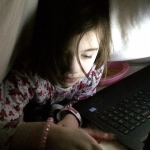All summer long, mum dropped heavy hints, and made carefully crafted statements. Money did not grow on trees, she said. I had my life, and now I urgently needed to do something with it. Over our tea, as a tight-lipped aside, she wondered whether banks gave poets mortgages. Subtly, she vocalised worries about what would happen were I not to change personalities entirely, right now, knuckle down for once, obtain a respectable career, and enjoy a lifetime of financial security. “What will become of you, Christopher?” was a common, and not unreasonable, refrain. It was 1997, and although Tony Blair (who my parents liked) was radically improving Britain, he said, I was quite gormless. I sat in my room writing bad poetry, and mooning over girls who weren’t aware of my existence. I was so gormless I didn’t have much anxiety about the future at all. I saw only beauty. My mum had to tell me to wash.
One day, over corned beef hash, she laid it down: a careers interview had been arranged; at not inconsequential cost; with an agency in Middlesbrough.
I wore my dad’s suit, and ambled into town on a blustery autumn morning. I passed Albert Park. My mind wandered into the past, and I mused how odd it was that I was no longer a child, when the park was still full of swings and ice-cream, ducks and bread.
*
‘Mr Walsh?’ she smiled. A girl not much older than me, with inch-thick slap. I was led into a box room with one small high window, and seated. ‘I’m Melanie,’ she said. ‘Today we’re going to find out which job will suit you.’
I was busy trying to read her. My initial conclusion was that Melanie might be a tick-box kind of person.
She brought out her list of questions. ‘So, what do you like to do?’
‘I like walking,’ I said. ‘And reading.’
She carefully wrote these down. ‘Can you be more pacific?’ she asked.
I didn’t think we were here to discuss the high seas. ‘It’s hard to be specific,’ I said. ‘I’m interested in the world as a whole, but not necessarily any one part of it.’
I saw her write World as a Whole in fat girlish handwriting. She looked up. ‘Your mum said you were interested in accountancy,’ said Melanie. Any bravado I’d brought into the room (anxiety’s overalls) deserted me. Evidently now reading me, Melanie laughed; ‘Are you?’
‘What is it?’ I asked. I wasn’t being peevish; I hadn’t a clue. Melanie now brought forth a sheaf of literature on choosing a career in accountancy, and began to read them to me. I couldn’t take it in. My eyes sought the small room’s single high window. Seagulls flashed past in the wind.
‘How does that sound?’ asked Melanie.
‘It sounds OK.’
‘Are you sure?’ she asked.
‘I think I would like to be a writer,’ I said, staring at her, aiming the words, and blushing.
‘Books?’ she asked. I nodded. Melanie rifled through her box of pamphlets, then looked up at me; ‘Why?’
‘Because I think I might be a writer,’ I said.
Melanie stared at me; ‘Hang on,’ she said, and left the room. She returned with a stern-looking older woman, who peered at me over reading glasses.
‘You can write for a hobby,’ said the woman.
‘I want to write for a living,’ I said.
‘There’s no money in it at all,’ she said.
I wasn’t interested in money. I knew I should be. I tried to tell her this.
‘Listen,’ said the woman, ‘I can’t send you home with writer as the outcome of this careers interview.’
I thought about the money my parents had spent.
‘Could he start with a newspaper round?’ asked Melanie. ‘That’s writing.’
The older woman glared at her, and didn’t answer her.
‘Maybe I could be an accountant after all,’ I said.
‘That sounds like a very good idea,’ said the woman. She nodded at Melanie, and left. The pamphlets on accountancy were brought out again, and thrust into my lap. Melanie wrapped up the consultation, and wished me luck. I went outside into the wind, sat on a bench, and thought hard about what I’d say to my mum. Seagulls circled above my head. They were inland. Someone had told me this meant it was rough out at sea.
…
Biography
Chris Walsh grew up in Middlesbrough and now lives in Kent. His debut novel, The Dig Street Festival, will be published in March 2021 by Louise Walters Books. Chris was recently interviewed by the Philip Larkin Society about Larkin’s influence on his writing. He was most recently published, in May 2020, by Moxy Magazine @WalshWrites
Image via Unsplash.com





